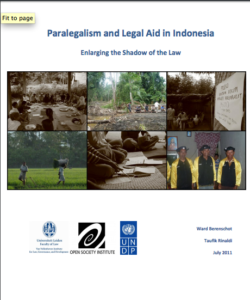Paralegalism and Legal Aid in Indonesia: Enlarging the Shadow of the Law
By: Ward Berenschot, Taufik Rinaldi
This report discusses the functioning of community-based paralegals in Indonesia, focusing on the paralegals trained under UNDP and World Bank projects. Indonesian legal aid organizations as well as international aid agencies employ paralegals as an instrument to strengthen the capacity of disadvantaged citizens to gain access to formal and informal justice systems. This report uses material and observations from two paralegal programs to discuss and analyze how and under what circumstances paralegals impact the way local disputes and grievances are addressed.
Combining a quantitative analysis of 338 reports of cases handled by paralegals and a qualitative study of case-handling by paralegals as well as non-paralegals, this report discusses the way paralegals operate in their communities, and it analyses under what circumstances paralegals can be most effective. With its focus on documenting the functioning of paralegals, this report is not an evaluation of the studied paralegal-programs, but offers a detailed perspective of their role in Indonesian legal aid provision.
This report was published in July 2011 as a collaborative effort funded by the Open Society Institute, United Nations Development Program, World Bank, Van Vollenhoven Institute, BAPPENAS and the Dutch Embassy in Jakarta. It will be included as a chapter in the forthcoming Six-Country Study on Paralegal Movements.

